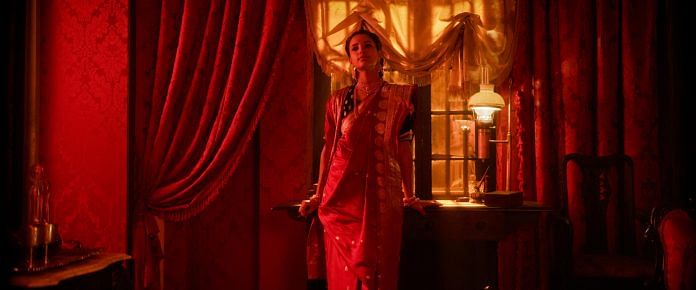The year is 1881, the place is the presidency of Bengal. A young girl, probably no more than 10 years old, is being married off to a man much older than her. Her aunt, who is helping her get dressed, puts toe-rings on the girl’s feet and explains that they are worn to control women. Immediately, you know where this is going.
Bulbbul, out on 24 June on Netflix, is directed by debutante Anvita Dutt, who has written screenplays, dialogues and lyrics for a host of movies. It is produced by Anushka Sharma and her brother Karnesh Ssharma’s Clean Slate Filmz, a company that has established itself as one that backs strong stories that are well told. NH-10, Phillauri (also written by Dutt) and Pari are cases in point, as is the recent Amazon Prime Video series Paatal Lok.
These films also have one more thing in common — they put women front and centre. And Bulbbul is no different.
Also read: Penguin review: Watch it for Keerthy Suresh and beautifully shot scenes of horror
Upturns the idea of a fairy-tale into a feminist fable
A supernatural horror film that’s also a period drama and a social commentary on the ugliness of patriarchy, Bulbbul is built on a familiar premise — the grandmother’s tale. No matter which part of India one is from, one has probably heard some or other version of a local legend, a fairy-tale, a horror story. As kids, we lapped them up as entertainment, but in reality, they were all cautionary tales, meant to prevent us from straying from the trodden path. And in almost all of them, the one who strayed was a woman.
Witch, chudail, demon, daayan — these are just some of the words often used to describe any woman who doesn’t fit the mould and doesn’t want to. That indifference to fitting in scares people so much that they cannot understand it and give it a supernatural spin, which is exactly what Anvita Dutt, who has also written the movie, plays on.
Bulbbul, a child, is given in marriage to the wealthy Thakur Indranil (played by Rahul Bose). She doesn’t even realise what has happened, as she thinks she is marrying his younger brother, Satya, who is her age. She is scared and uncomfortable in her palatial new home, with her much-older husband who is a stranger, his younger brother Mahendra (also played by Bose), who has mental problems and who gets far too close for comfort, and Mahendra’s wife, Binodini (Paoli Dam), who has swallowed the misogyny of this household like a pill. Binodini cannot stomach the fact that she has to call this child Badi Bahu, and is, effectively, rendered her junior.
Sensitive to Bulbbul’s fears, little Satya tries to distract her. “Kahaani sunogi?” he asks on the palanquin ride after the wedding, and starts to tell her a chudail story. This becomes a leitmotif, with Bulbbul and Satya growing up spending all their time together, writing stories. Their closeness doesn’t sit well with Indranil.
Cut to 20 years later, when a grown-up Satya (Avinash Tiwary) returns after several years away. Indranil has left. And a grown Bulbbul (Tripti Dimri) has a close friendship with the local doctor Sudip (Parambrata Chattopadhyay) and is insouciant and unconcerned about the rules. Even her old friend Satya disappoints her with his conservative notions of a woman’s place.
And then there are the gruesome murders of several men in the neighbourhood, from Mahendra to the wife-beating Master Dinkar, all believed to be at the hands of a chudail.
Also read: Spelling The Dream: Netflix docu film on desi success at spelling bee is gripping but limited
Stunning visuals and haunting music add to the mood
At just about one and a half hours, Bulbbul is a neatly told movie, and features solid performances by all the main actors as well as some gorgeous cinematography courtesy Siddharth Diwan and production design by Meenal Agarwal. The attention to visual detail, be it the costumes or the tiles of the haveli floors, is commendable, and the music by Amit Trivedi is haunting and moody. Yet one wishes the same attention had been given to fleshing out the script and characters a bit better. Paoli Dam, for example, is fantastic as the creepy sister-in-law, but we don’t get to see her back story and that’s a shame. And while some parts of the story are genuinely horrifying and shocking, some are far too predictable.
But overall, Bulbbul is an engaging story that asks an important question: What is the real horror — a witch who swings from trees and has misshapen feet or the unimaginable torture that so many women and girls go through at the hands of men?
It’s a question that stays with you long after the movie is over.
Also read: 5 performances by which to remember Sushant Singh Rajput — from Kai Po Che! to Chhichhore



